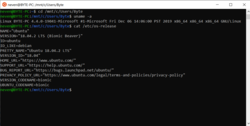Linux (/ˈlɪnʊks/ LIN-uuks) is a family of open source Unix-like operating systems based on the Linux kernel, an operating system kernel first released...
121 KB (11,095 words) - 20:56, 22 July 2025
The Linux kernel is a free and open source: 4 Unix-like kernel that is used in many computer systems worldwide. The kernel was created by Linus Torvalds...
194 KB (18,303 words) - 08:06, 1 August 2025
A Linux distribution, often abbreviated as distro, is an operating system that includes the Linux kernel for its kernel functionality. Although the name...
54 KB (5,482 words) - 02:37, 3 August 2025
Linux Mint is a community-developed Linux distribution based primarily on Ubuntu, with an alternative version based on Debian known as Linux Mint Debian...
79 KB (5,587 words) - 23:52, 17 July 2025
Arch Linux (/ɑːrtʃ/) is an open source, rolling release Linux distribution. Arch Linux is kept up-to-date by regularly updating the individual pieces...
57 KB (5,057 words) - 02:36, 1 August 2025
Fedora Linux is a Linux distribution developed by the Fedora Project. It was originally developed in 2003 as a continuation of the Red Hat Linux project...
49 KB (4,094 words) - 11:37, 17 July 2025
This page provides general information about notable Linux distributions in the form of a categorized list. Distributions are organized into sections...
92 KB (3,302 words) - 19:01, 1 August 2025
Kali Linux (from the Hindu goddess Kali) is a Linux distribution designed for digital forensics and penetration testing. It is maintained and funded by...
26 KB (2,170 words) - 08:18, 1 August 2025
Look up Linux in Wiktionary, the free dictionary. Linux is a family of computer operating systems based on the Linux kernel. Linux may also refer to: 9885...
384 bytes (87 words) - 06:14, 7 April 2024
Alpine Linux is a Linux distribution designed to be small, simple, and secure. It uses musl, BusyBox, and OpenRC instead of the more commonly used glibc...
11 KB (930 words) - 05:11, 26 June 2025
Technical variations of Linux distributions include support for different hardware devices and systems or software package configurations. Organizational...
140 KB (4,202 words) - 21:48, 26 July 2025
Gentoo Linux (pronounced /ˈdʒɛntuː/ JEN-too) is a Linux distribution built using the Portage package management system. Unlike a binary software distribution...
55 KB (4,562 words) - 16:33, 16 July 2025
Mandriva Linux, a fusion of the French distribution Mandrake Linux and the Brazilian distribution Conectiva Linux, is a discontinued Linux distribution...
29 KB (2,664 words) - 19:43, 10 July 2025
This article documents the version history of the Linux kernel. Each major version – identified by the first two numbers of a release version – is designated...
199 KB (8,816 words) - 19:04, 1 August 2025
Windows Subsystem for Linux (WSL) is a component of Microsoft Windows that allows the use of a Linux environment from within Windows, foregoing the overhead...
37 KB (3,492 words) - 18:20, 27 July 2025
Linux Australia is the national, Australian Free and Open Source Software Community organisation. It was founded in 1997 and formally incorporated in...
4 KB (458 words) - 12:16, 11 October 2024
Clear Linux OS is a discontinued Linux distribution, once developed and maintained on Intel's 01.org open-source platform, and optimized for Intel's microprocessors...
17 KB (1,097 words) - 17:16, 25 July 2025
Tux (mascot) (redirect from Linux penguin)
the Linux kernel. Originally created as an entry to a Linux logo competition, Tux is the most commonly used icon for Linux, although different Linux distributions...
20 KB (2,025 words) - 06:30, 30 July 2025
Red Hat Enterprise Linux (RHEL) is a commercial Linux distribution developed by Red Hat. Red Hat Enterprise Linux is released in server versions for x86-64...
83 KB (7,959 words) - 21:50, 23 July 2025
Linus Torvalds (redirect from Linux Torvalds)
Finnish software engineer who is the creator and lead developer of the Linux kernel. He also created the distributed version control system Git. He was...
51 KB (4,087 words) - 14:52, 16 July 2025
The Linux Foundation (LF) is a non-profit organization established in 2000 to support Linux development and open-source software projects. The Linux Foundation...
56 KB (3,668 words) - 04:09, 30 June 2025
Linux vendors and users, SCO alleged that its license agreements with IBM meant that source code IBM wrote and donated to be incorporated into Linux was...
58 KB (7,473 words) - 06:44, 18 July 2025
The Linux Symposium was a Linux and open source conference held annually in Canada from 1999 to 2014. The conference was initially named Ottawa Linux Symposium...
3 KB (300 words) - 18:34, 28 July 2024
Linux malware includes viruses, Trojans, worms and other types of malware that affect the Linux family of operating systems. Linux, Unix and other Unix-like...
58 KB (4,842 words) - 05:50, 2 July 2025
Namespaces are a feature of the Linux kernel that partition kernel resources such that one set of processes sees one set of resources, while another set...
15 KB (1,621 words) - 09:06, 3 January 2025
Rocky Linux is a Linux distribution developed by Rocky Enterprise Software Foundation, which is a privately owned benefit corporation that describes itself...
24 KB (1,580 words) - 22:50, 30 June 2025
Security-Enhanced Linux (SELinux) is a Linux kernel security module that provides a mechanism for supporting access control security policies, including...
36 KB (3,634 words) - 13:45, 19 July 2025
Puppy Linux is a family of light-weight Linux distributions that focus on ease of use and minimal memory footprint. The entire system can be run from...
38 KB (3,998 words) - 16:42, 1 August 2025
Linux on IBM Z, Linux on zSystems or zLinux is the collective term for the Linux operating system compiled to run on IBM mainframes, especially IBM Z /...
22 KB (2,378 words) - 08:34, 16 July 2025
Linux began in 1991 as a personal project by Finnish student Linus Torvalds to create a new free operating system kernel. The resulting Linux kernel has...
69 KB (7,620 words) - 17:32, 16 March 2025
















